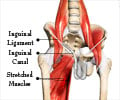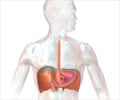Causes of Hernia
Undue straining or pressure can facilitate the formation of Hernias through defects in the abdominal muscles
Most hernias develop at weak spots in the abdominal wall. The weakness may be present at birth, or it may develop later in life for a variety of reasons. Most often hernia protrusion is not a sudden event and occurs over a period of time. Once an area is weak and unsupported it yields to persistent pressure. Any unusual pressure on the abdomen can cause a hernia to develop. Some of the causes of hernias are:
- Heavy lifting
- Unusually severe cough
- Pregnancy
- Obesity or sudden and excessive weight loss
- Chronic constipation
- Straining while urination
- Fluid in the abdomen (Ascites)
- Aging
- Previous surgical procedures
It has been suggested that in the Homo sapiens species in many mammalian quadrupeds, there is an evolutionary defect due to a lack of a special covering inside the lower section of the abdomen called the posterior rectus sheath along with a weak fascia called the transversalis fascia in the groin. In quadrupeds this defect is inconsequential as the inguinal channel is directed upwards during ambulation and hence there is no gravitational stress. However in the humans the erect posture creates not only gravitational stress but also the added burden of the intra-abdominal organs that have a tendency to protrude towards the lower abdomen as there is less support in this area. This results in an increase in the incidence of inguinal hernias – both direct and indirect.


















